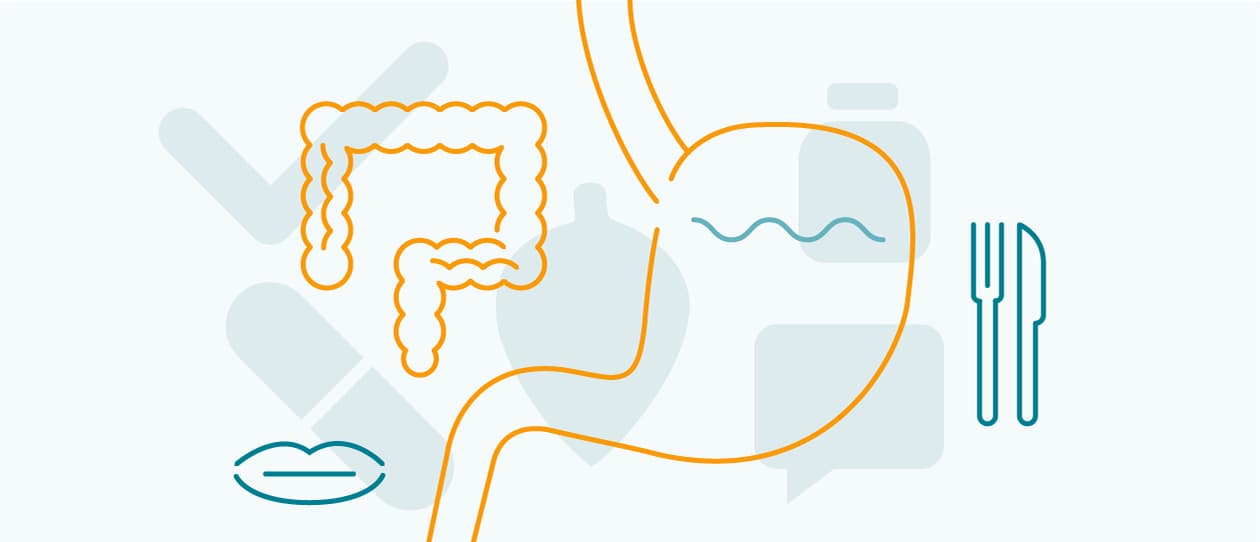
- Health hub/
- Tips & Advice on Improving your Digestive Health/
- Symptoms and Causes of Reflux


- Burning pain behind the sternum (breastbone) that may also spread up the throat
- Pain tends to be aggravated by lying down
- A sour taste at the back of the mouth
- Coughing, wheezing
- Sore throat, hoarse voice
If reflux becomes chronic (persists for a long time), complications may include:
- Oesophagitis (inflammation of the oesophagus)
- Erosion and ulceration of the oesophageal tissue
- Narrowing of the oesophagus (stricture)
- Cellular changes, in which the cells of the oesophagus take on the characteristics of the tissues of the stomach and intestine. (This condition is called Barrett’s oesophagus, and increases the risk of later developing oesophageal cancer).
Once food is swallowed it is transported through the oesophagus to the stomach by waves of muscular movement called peristalsis. Once it arrives in the stomach, the force of gravity takes over, keeping the food from moving back up the oesophagus.
In reflux, gastric acids from the stomach move upwards into the oesophagus, against the effects of gravity. Unlike the cells of the stomach, the cells of the oesophagus are not acid-resistant, so their exposure to these gastric juices results in the characteristic burning pain, and over the long term may lead to inflammation and damage to the oesophageal tissue.
Contributing factors may include:
- Hiatus hernia, which involves the displacement of part of the stomach up through a hole in the diaphragm
- Weakness of the sphincter (valve) between the stomach and oesophagus
- Abnormal emptying of the stomach after eating
Factors that may trigger or aggravate reflux include:
- Eating too much
- Spicy foods
- Fatty foods
- Chocolate
- Caffeine
- Alcohol
- Soft drinks and other carbonated beverages
- Tomato sauce
- Mint
- Smoking
- The use of certain medications (including some blood pressure drugs and some sedatives)
- Being overweight or obese
- Wearing tight clothing while eating
- Lying down after eating
- If reflux is an ongoing problem for you, you may need to take a long-term approach to its management, working with your healthcare professional to identify foods and other factors that trigger or aggravate your symptoms, and taking medication as advised by your doctor.
- In many cases, changing your diet to one based on smaller meals and excluding any aggravating foods can go a long way towards relieving the problem. In particular, avoid spicy and fatty foods, alcohol, caffeine, chocolate, mint, tomato sauce and carbonated beverages.
- Concentrating on chewing your food thoroughly will stop you from eating too fast, and may help prevent heartburn and maintain healthy, comfortable digestion.
- Avoid eating on the run or when you’re under stress.
- Slippery elm powder has traditionally been used to soothe irritated or inflamed mucous membranes of the digestive tract, and may help relieve pain and promote healing. However, it may interfere with the absorption of other medicines; separate doses by two hours.
- Don’t smoke as it may aggravate your symptoms.
- Elevating the head of your bed by a few inches may help reduce evening episodes of indigestion and reflux by using gravity to prevent food moving upwards from the stomach to the oesophagus.
- If you’re overweight, working with your healthcare professional to devise a diet and exercise regime that allows you to achieve a healthy body weight may help to relieve your indigestion and reflux.
- Avoid bending over, lifting heavy objects and similar activities that increase the pressure on the digestive organs, especially after meals, and avoid wearing tight or constricting clothing while you’re eating.
- It is not uncommon for the symptoms of a heart attack to be mistakenly attributed to indigestion. If you experience unusual indigestion-like pain that radiates to the shoulder, arm or neck, it’s possible you are having a heart attack. Call for an ambulance immediately, as it’s better to be safe than sorry.
- If you regularly experience the symptoms of reflux, it is important that you consult your doctor. In some cases, these symptoms may be indicative of an underlying disease, such as Barrett’s oesophagus, which requires medical management and monitoring.




